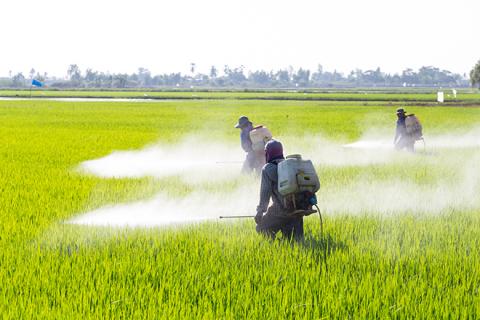Julio 27, 2021
How to protect yourself from pesticides and their harmful effects on your health

Pesticide exposure represents a health risk, especially for agricultural workers. Many agricultural jobs use chemicals to get rid of pests. These chemicals can come in liquid, powder, or gas form. Some pesticides leave a residue in the atmosphere, on clothing, and on work equipment, which can also be dangerous for workers’ health.
An employer must share all relevant information about the use and dangers of pesticides with those who could be exposed in the workplace. If you have questions about the use of pesticides in your workplace, consider raising them to your employer.
While not all pesticides are dangerous for your health, some can have very serious effects. Dangerous exposure occurs when pesticides enter your body through your eyes, skin, mouth, or via the air we breathe. For this reason, it is very important for any business that uses pesticides to have health and safety protocols and to provide workers with adequate protective equipment and training. These security measures can help avoid worker exposure.
The harmful effects of pesticides
Symptoms of pesticide exposure include breathing and digestive problems, weakness, exhaustion, irritation of your eyes, skin, throat, or nose, and changes in your mental state. In very serious cases of people who are regularly exposed, pesticides can cause chronic illnesses. The intensity of symptoms depends not only on the length and magnitude of exposure and the quantity and concentration of the pesticides, but also on the type of pesticides.
How to protect yourself from pesticides
Normally, pesticides have warning labels that explain how to safely prepare, apply, store, and get rid of them. These labels also explain what type of personal protective equipment (PPE) should be used to maintain worker safety. People who work with or near pesticides should follow all of the instructions on the warning labels. No worker should be exposed to pesticides without the PPE required by the warning label. What constitutes adequate PPE depends on the type of pesticides, but it can include respirators, special clothing, safety goggles, and boots.
Recommendations for people who work with pesticides
Wear a long sleeved shirt and gloves to protect your arms and hands (in addition to all of the equipment required by the warning label)
Wash your hands frequently.
If possible, remove your work clothing at your workplace and shower before going home.
Avoid contact with other people before you take off your work clothes and shower so you do not transfer pesticide residue.
Remember that under safety and health laws, there are many regulations about pesticide use to protect workers against exposure.Central points of the regulations say:
The risks to your health depend on the type and quantity of pesticides you regularly use.
Employers must inform workers about the identity of the pesticides they use and any known hazards.
Warning labels have important information about safe and proper use of pesticides.
Workers need adequate PPE before working in a place where they could be exposed to pesticides.
This blog is not legal advice. If you or someone you know is suffering some type of abuse or problem at work, you can contact Centro de los Derechos del Migrante, Inc. (CDM). You can call from Mexico at 800-590-1773 or from the United States at 855-234-9699. The hours of operation are Monday through Friday from 9:00 AM to 5:00 PM CT.
Imágen: Flickr/ProcuraMed Saúde 2016 /Vía Flickr.com
